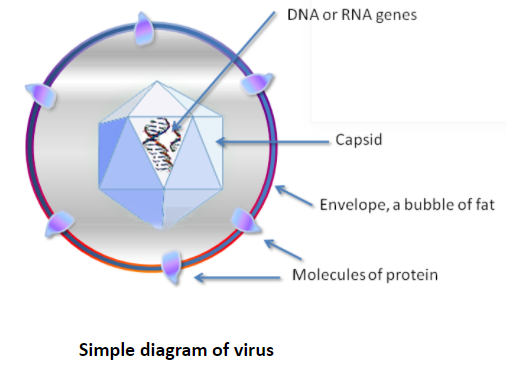
Why are viruses considered to be non-living?
A. They do not have cells.
B. They cannot reproduce on their own.
C. They have no metabolic activity.
D. All of the above.
Answer
588.6k+ views
Hint: Outside the host cell virus behaves like matter. Only upon finding a living host organism, it injects its DNA/RNA to propagate its genes.
Complete answer: Virus is an infectious agent and quite small.
It injects its genetic material into the host and replicates within the living cells of the host.
A virus is made up of just genetic material, be it DNA or RNA.
The genetic material is covered by a protein-made capsule, often called a capsid.
The virus first attaches to the surface of bacteria.
It occurs by random encounters; then it injects genetic material through the host cell membrane.
The protein coat remains outside of the host cell.
After injecting viral DNA, the normal mode of replication and transcription does not occur in the host cell.
Rather, the host cell now produces viral DNA and its proteins.
Hence, it has no cell and metabolic activity and it cannot reproduce on its own.

So, the correct option is D. All of the above.
Note: The entire virus is called a virion and it consists of both the outer capsid shell and the inner nucleic acid component. The capsid provides specificity of the virus while the nucleic acid is the cause of its infectivity.
Complete answer: Virus is an infectious agent and quite small.
It injects its genetic material into the host and replicates within the living cells of the host.
A virus is made up of just genetic material, be it DNA or RNA.
The genetic material is covered by a protein-made capsule, often called a capsid.
The virus first attaches to the surface of bacteria.
It occurs by random encounters; then it injects genetic material through the host cell membrane.
The protein coat remains outside of the host cell.
After injecting viral DNA, the normal mode of replication and transcription does not occur in the host cell.
Rather, the host cell now produces viral DNA and its proteins.
Hence, it has no cell and metabolic activity and it cannot reproduce on its own.

So, the correct option is D. All of the above.
Note: The entire virus is called a virion and it consists of both the outer capsid shell and the inner nucleic acid component. The capsid provides specificity of the virus while the nucleic acid is the cause of its infectivity.
Recently Updated Pages
Master Class 11 Computer Science: Engaging Questions & Answers for Success

Master Class 11 Business Studies: Engaging Questions & Answers for Success

Master Class 11 Economics: Engaging Questions & Answers for Success

Master Class 11 English: Engaging Questions & Answers for Success

Master Class 11 Maths: Engaging Questions & Answers for Success

Master Class 11 Biology: Engaging Questions & Answers for Success

Trending doubts
One Metric ton is equal to kg A 10000 B 1000 C 100 class 11 physics CBSE

There are 720 permutations of the digits 1 2 3 4 5 class 11 maths CBSE

Discuss the various forms of bacteria class 11 biology CBSE

Draw a diagram of a plant cell and label at least eight class 11 biology CBSE

State the laws of reflection of light

10 examples of friction in our daily life




